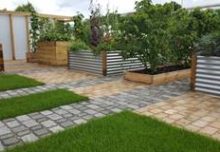
Having an allotment is growing more and more popular, as food prices rise and also as people find pleasure in ‘growing their own’. The focus of National Allotment Week is to get allotment sites to invite people to come and see what happens behind the gates!
Allotments are for everyone, young and old, families to school groups, working couples and retired individuals. Everyone benefits from the exercise, fresh air and the fresh fruit and vegetables.
August is the perfect time to visit as plenty of the fruit and vegetables will be ready to harvest and eat. It is also possibly one of the busiest times of the gardening year as crops need watering, fruits are ripening and are picked, plants are pruned and we prepare the soil for autumn sowings.
Many allotments will be holding tea parties, barbeques and quizzes using the theme of the week which is has ‘fruity’ feel in celebration of the variety of sweet and succulent crops you can grow on a UK allotment. To find an event near you check the National Allotments Week pages on www.nsalg.org.uk. Too often allotments are thought of as places that only grow the humble potato or everyday carrot, but in truth they offer a cornucopia of delicious treats – from sumptuous strawberries, ravishing raspberries and glorious gooseberries through to beautiful blackberries, precious plums and appetising apples.
Whether you are a first time allotment holder or are an old hand, taking a little time to prepare yourself and remain injury-free is vital. The McTimoney Chiropractic Association (MCA) has the following advice:
- Before you start, make sure your tools are right for you. Ask advice at your garden centre about the height of the spade, hoe or fork you should be using. There are lighter ranges, long-handled ranges and those with ergonomic handles. It makes sense to try different types and find the ones that suit you best.
- Try putting together a daily stretching programme and you will notice a marked improvement in your movements. Stretching increases flexibility and strength, so digging, raking or weeding becomes easier as you increase your core strength. The MCA has a useful free leaflet which shows and describes a wide range of back exercises.
- Take it steadily! Don’t try and dig the entire plot in one go! Give yourself regular breaks in tasks, say every 20 minutes. Warm up with the gentler activities such as picking ripe fruit and vegetables before going onto serious digging!
- Digging for a long period is tiring, so try and swap activities regularly and intersperse digging with raking or gentle weeding so you have a balance of high input activity with gentler tasks. Try and swap sides regularly so you don’t do all the work on one side of your body.
- If you have a lot of watering to do, balance yourself by carrying two watering cans of roughly the same weight. Don’t heave large bags of compost; instead use your wheelbarrow to move them. Pick items up with bent knees and a straight back.
- Try and design your allotment with your back in mind. Raised beds are all the rage at the moment and they are worth looking at as they do have advantages in reducing the amount of bending you need to do. They can be easier to plant, weed, water and harvest than in-ground beds.
- If you do have a potting shed or greenhouse, make sure that work benches are the correct height to avoid stooping.
- You may also want to keep chickens or bees at your allotment. If you do, make sure you can manage their housing easily or ask a fellow plot holder to give you a hand.



